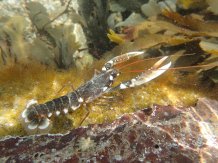Articles

Sustainable Aquaculture Futures members win papers of the year awards at Cefas
The collaborative centre for Sustainable Aquaculture Futures (SAF) is celebrating double success in the Cefas (Centre for Environment, Aquaculture and Fisheries Science) Paper of the Year competition, with colleagues winning in two out of the three categories.
Corey Holt, former SAF PhD student and post-doctoral researcher, won the Student Award for discovering, with co-authors, the first clawed lobster virus.
Corey’s research projects within SAF included understanding the role of gut microbiomes in health and disease in the European lobster and in shrimp.
As global aquaculture production increases, a focus on animal health during production becomes ever more important and in his work Corey highlights how the gut microbiome is intimately linked to health and cultivation success in crustaceans.
Further success came from Dr David Bass and his team, including SAF scientists Professor Charles Tyler (University of Exeter) and Professor Grant Stentiford (Cefas), winning Overall Cefas Paper of the Year with “The Pathobiome in Animal and Plant Diseases” looking at interactions between host-associated microbes, the host and its environment.
This paper highlights how the one pathogen-one disease paradigm is shifting towards the pathobiome concept, and the importance of integrating the interaction of multiple symbionts, host, and the environment in understanding disease aetiology.
SAF is a joint initiative between Cefas and the University of Exeter.
Launched in 2017, SAF is bringing together a network of world leaders in the fields of aquatic animal health, food safety, and protection of the aquatic environment, to ensure the key challenges facing sustainable growth of the aquaculture industry are better understood, both in the UK and internationally.
Current selected SAF activities include:
• Projects to help establish environmentally & commercially sustainable techniques for farming seaweed, evaluating and maximising its environmental benefits, and understanding how farming shellfish and seaweed can mitigate the impacts of degraded water quality on aquatic wildlife.
• RCUK funded projects looking at innovation in genetics and breeding to advance UK aquaculture production (AquaLeap), and investigating the impact of early life history in freshwater recirculation aquaculture systems on the robustness of Atlantic salmon and their susceptibility to disease at sea (RobustSmolt).
• A BBSRC GCRF multidisciplinary project engaging with the hatchery sector in the Bangladesh shrimp industry to improve biosecurity, and thereby reducing the risk of disease, environmental impact and the spread of antimicrobial resistance.
See the SAF website for more information.
Date: 23 June 2020
